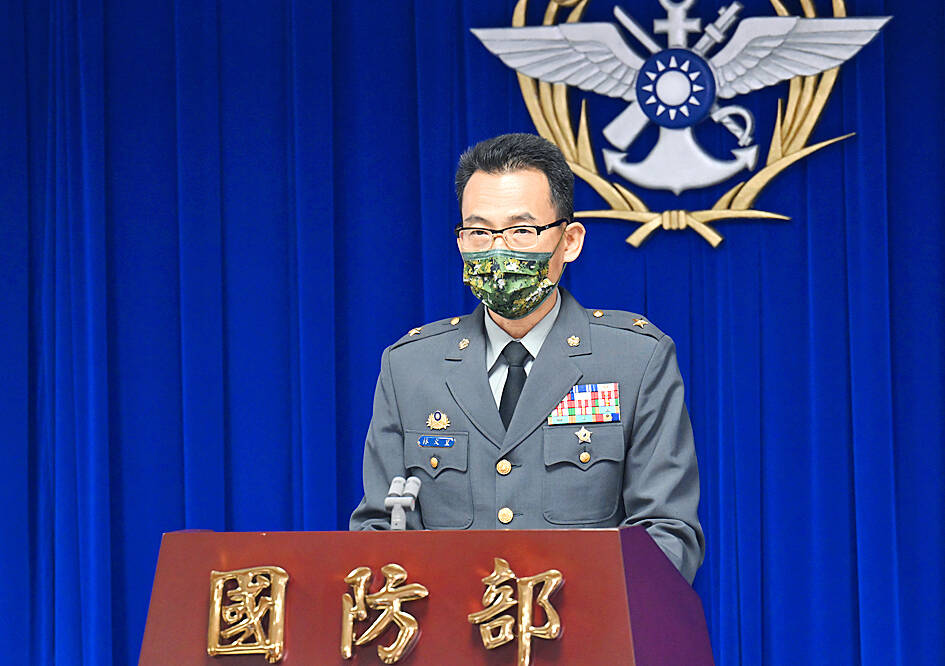A joint Taiwan-US After Action Review team has declared the recently concluded five-day tabletop war game phase of Taiwan’s annual Han Kuang military exercises a success, a senior military official said yesterday.
The team that observed the computerized wargames held from May 15 to 19 has concluded that the defensive force in the simulations was able to achieve all pre-set training goals and is therefore capable of defending itself, Major General Lin Wen-huang (林文皇), who is in charge of planning at the Ministry of National Defense, told a briefing yesterday.
The five-day, around-the-clock war games were conducted using the US-built Joint Theater Level Simulation platform to simulate joint, combined and coalition civil-military operations at the operational level, Lin said.

Photo: Tien Yu-hua, Taipei Times
The simulations are meant to test the ability of military personnel to coordinate and launch a response to a Chinese invasion, Lin said.
A number of potential invasion scenarios were run during the war games based on the latest military threats posed by the Chinese People’s Liberation Army, which recently sent warplanes and warships to surround Taiwan, he added.
What the armed forces learned from these simulations was more important than whether the invaders or defenders ultimately won the war games, he said.
Lin did not disclose who comprised the joint Taiwan-US review team.
A military source previously said that the team consisted of retired US generals and their active-duty Taiwanese counterparts.
The Americans came as observers to provide suggestions on the tabletop war games, which simulated the armed forces’ defensive response to various attack scenarios, the source said, without going into detail.
Similar US teams have made regular visits to Taiwan for the annual exercises in the past, the source said.
The Han Kuang exercises have been held annually since 1984, in the form of live-fire drills and computerized war games, to test Taiwan’s combat readiness in the face of a possible Chinese invasion.
This year marks the 39th edition of the annual exercises, which are Taiwan’s most important military drills and include all branches of the armed forces.
The live-fire exercise component of the exercises is scheduled for July 24 to 28.

CHAOS: Iranians took to the streets playing celebratory music after reports of Khamenei’s death on Saturday, while mourners also gathered in Tehran yesterday Iranian Supreme Leader Ayatollah Ali Khamenei was killed in a major attack on Iran launched by Israel and the US, throwing the future of the Islamic republic into doubt and raising the risk of regional instability. Iranian state television and the state-run IRNA news agency announced the 86-year-old’s death early yesterday. US President Donald Trump said it gave Iranians their “greatest chance” to “take back” their country. The announcements came after a joint US and Israeli aerial bombardment that targeted Iranian military and governmental sites. Trump said the “heavy and pinpoint bombing” would continue through the week or as long

TRUST: The KMT said it respected the US’ timing and considerations, and hoped it would continue to honor its commitments to helping Taiwan bolster its defenses and deterrence US President Donald Trump is delaying a multibillion-dollar arms sale to Taiwan to ensure his visit to Beijing is successful, a New York Times report said. The weapons sales package has stalled in the US Department of State, the report said, citing US officials it did not identify. The White House has told agencies not to push forward ahead of Trump’s meeting with Chinese President Xi Jinping (習近平), it said. The two last month held a phone call to discuss trade and geopolitical flashpoints ahead of the summit. Xi raised the Taiwan issue and urged the US to handle arms sales to

BIG SPENDERS: Foreign investors bought the most Taiwan equities since 2005, signaling confidence that an AI boom would continue to benefit chipmakers Taiwan Semiconductor Manufacturing Co’s (TSMC, 台積電) market capitalization swelled to US$2 trillion for the first time following a 4.25 percent rally in its American depositary receipts (ADR) overnight, putting the world’s biggest contract chipmaker sixth on the list of the world’s biggest companies by market capitalization, just behind Amazon.com Inc. The site CompaniesMarketcap.com ranked TSMC ahead of Saudi Aramco and Meta Platforms Inc. The Taiwanese company’s ADRs on Tuesday surged to US$385.75 on the New York Stock Exchange, as strong demand for artificial intelligence (AI) applications led to chip supply constraints and boost revenue growth to record-breaking levels. Each TSMC ADR represents

State-run CPC Corp, Taiwan (CPC, 台灣中油) yesterday said that it had confirmed on Saturday night with its liquefied natural gas (LNG) and crude oil suppliers that shipments are proceeding as scheduled and that domestic supplies remain unaffected. The CPC yesterday announced the gasoline and diesel prices will rise by NT$0.2 and NT$0.4 per liter, respectively, starting Monday, citing Middle East tensions and blizzards in the eastern United States. CPC also iterated it has been reducing the proportion of crude oil imports from the Middle East and diversifying its supply sources in the past few years in response to geopolitical risks, expanding